Insider Tips on the Successful College Tour, with CIT Consultant Lessa Scherrer
Hello Lessa! You’re our inside expert on all things related to the college tour. Let’s begin by talking about how COVID has changed the college tour.
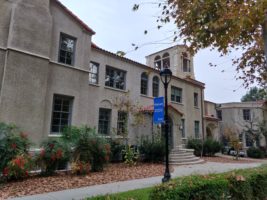
Admissions, Sumner Hall, Pomona College
During the height of the pandemic, colleges closed for guided, in-person tours. Many are now open but with modified tours that often don’t go into campus buildings. Many families are worried that they won’t get the “full campus experience” from such a tour – for example, the possible problems posed by not being able to enter dormitories. I think that a lot can be learned from just walking around campus and observing the students and how they interact. Are they walking in groups and talking? Heads down over their phones? Is the cafeteria open so you can try the food? What is the area around campus like? All of these questions can be answered without going into a dorm or science building.
Many parents say to us, wow, the college tour was just not a big deal when I was applying to college, why is it such a big deal now? What’s your response to those parents?
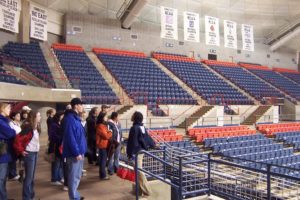
UConn Tour
Back in the day, students applied to one or two, mostly local, colleges. Tours were less important because our scope was smaller and students may have had the opportunity to visit campus for a local tournament, for example, or a summer camp. But the campus vibe is very different at a small liberal arts college in the Northeast and a big state flagship school in the Midwest. It’s important to visit at least some of your schools to experience what a particular type of campus might feel like.
At what point in the college process should families begin college tours?
While I have some families who begin college tours in sophomore year, most families begin touring during spring break or the summer after junior year. If you have a student who is keen to begin, I suggest dropping by a nearby campus on family vacations even earlier. But don’t force a younger student who is not ready to visit any colleges. They probably won’t get anything out of it.
Is the college tour important in terms of whether or not a student is admitted to a particular college?
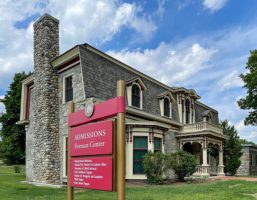
Forman Center, Rhode Island College admissions
For colleges that track demonstrated interest, visiting the campus in person with a registered tour can be very important. Colleges recognize what an effort visiting campus can be and believe that students who visit campus are more likely to actually enroll if admitted. This can mean the difference between a waitlist and an acceptance. I should mention that not all colleges track interest, so a visit means less to those colleges. Carnegie Mellon is not going to care if you’ve ever been to campus or not.
Money can be a factor in planning tours for many families. Some students have colleges all over the map, and touring them all can be a substantial investment for families and one they can hardly afford while anticipating college costs. What’s your best advice for these families? How do you work with families to establish priorities?
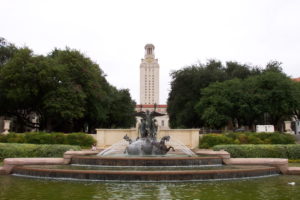
Littlefield Fountain, University of Texas
College tours can be inconvenient and expensive, for sure. Priorities drive the ultimate choices when not all colleges can be visited. What colleges are at the top of the list? What are their characteristics (size, location, majors, etc.)? Is there a similar school that is closer to home, even if not on your list, where you can get a feel for what the faraway school might be like?
Families who cannot travel to visit, or who prefer to visit after acceptances come in, can participate in virtual events, like admissions overviews, student panels, and virtual tours. It’s important to treat these events like in-person tours, though. Come prepared with questions and follow up with thank you notes, just like you would do for an in-person tour. Colleges want to see substantive interaction with the virtual event.
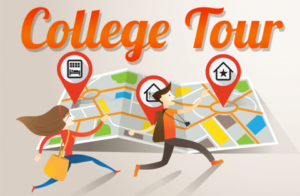 Families often struggle about when to tour. Class absences can make kids anxious, but touring in the summer presents its own set of difficulties.
Families often struggle about when to tour. Class absences can make kids anxious, but touring in the summer presents its own set of difficulties.
Some consultants recommend only touring during the school year because you can’t get the campus vibe without all the students and faculty there. In the summer, there are rarely classes to visit. It’s true that a crowded campus will seem less crowded during the summer. However, the students who are there are still representative of the students you will meet during the school year. A busy urban campus will still thrum with energy, and a more laid-back public college will be even more relaxed.

Admissions, Pomona College
Colleges can present so many options in terms of tours: the general tour, the tour that includes an admissions interview, and the tour that is specific to a particular area such as STEM. How do families sort the options so as to make the most of the tour experience?
We don’t recommend doing an admissions interview unless you’ve been thoroughly prepared by your consultant. Some of those interviews are evaluative, meaning they are evaluating how good a fit you are, and we want you to be well-prepared for such an interview. For colleges that are big enough to offer tours of specific schools within the university, you can often get more of the information you are looking for on those more specific tours. They allow you to get really excited about where you will eventually be learning, studying, and working.
Your tour is scheduled. What’s the best way to prepare for that tour now?

Raj Boora, University of Alberta tour guide
This could be a whole article in itself! Our best insider tips: Wear neat, comfortable clothes. Bring walking shoes, a hat, sunscreen, and a water bottle. (The campus tour at the University of Denver is 15,000 steps, at altitude!) Pack an umbrella or jacket, just in case. Don’t be a passive visitor: prepare some questions you can ask at admissions or ask the tour guide. (Look at the Essential College Visit Question List in the Files tab of the CIT portal for inspiration.) Have some way to take notes, whether on your phone or notepad and pencil. I promise that visiting multiple colleges in a short time will make them all run together.
Plan some time to think about your impressions of the college. This can be in the car on the way to the next college, or perhaps in the evening. Take notes about what you feel, either on your phone or on the CIT portal. Then talk to the people who toured with you to get their impressions.
Sometimes students have tours at colleges that everyone believes are a great fit, but they are assigned an “unsuitable” tour guide, and the student is devastated with disappointment. The college they thought they would love is now ruined.
Tour guides are human and sometimes they have bad days, or the weather is awful or the student or family is not feeling their best. It can be hard not to let that bad experience color your feelings about a campus. But if the campus is a great fit on paper, I suggest keeping it on your list. I had a student this year who had a bad tour experience at College of Wooster in the fall but was able to attend an accepted students day in the spring. Totally different experience! She’s enrolled at Wooster now and can’t wait!
Describe the work you do with families post-tour.
 We review the family’s notes and what their impressions are about the experience. Does the school meet your needs? Were there any red flags? How does this tour impact your thinking: if the University of Florida is too big or too remote, what other colleges should come off the list? If possible we transfer their impressions to notes in our CIT portal software, so we can use them in the eventual “Why Us?” supplemental college essay and in the final decision.
We review the family’s notes and what their impressions are about the experience. Does the school meet your needs? Were there any red flags? How does this tour impact your thinking: if the University of Florida is too big or too remote, what other colleges should come off the list? If possible we transfer their impressions to notes in our CIT portal software, so we can use them in the eventual “Why Us?” supplemental college essay and in the final decision.
Is there anything a student should do to follow up, after a tour?
Send thank-you notes to everyone who was nice to you. If you met with a faculty member or admissions officer, be sure to send them a thank you. Even tour guides often have business cards you can take with their contact information for follow-up emails! Make use of all the contacts you now have at the school to ask your questions.
 College Inside Track Consultant Lessa Scherrer has worked with many populations of students, including homeschoolers, students with learning differences, and the gifted. She is a former chair of American Mensa’s Gifted Youth Program, where she founded Young Mensa Magazine. Lessa spent seven years teaching ACT test prep and has also designed a college prep study skills curriculum for students preparing to apply to highly selective colleges.
College Inside Track Consultant Lessa Scherrer has worked with many populations of students, including homeschoolers, students with learning differences, and the gifted. She is a former chair of American Mensa’s Gifted Youth Program, where she founded Young Mensa Magazine. Lessa spent seven years teaching ACT test prep and has also designed a college prep study skills curriculum for students preparing to apply to highly selective colleges.
 Lessa is a graduate of the University of Michigan and holds a Certificate in CollegeAdmissions Counseling through UCLA. A former homeschooler and Renaissance Faire performer, Lessa is the mother of three grown boys and lives in Eau Claire, WI with her husband and two old dogs.
Lessa is a graduate of the University of Michigan and holds a Certificate in CollegeAdmissions Counseling through UCLA. A former homeschooler and Renaissance Faire performer, Lessa is the mother of three grown boys and lives in Eau Claire, WI with her husband and two old dogs.


